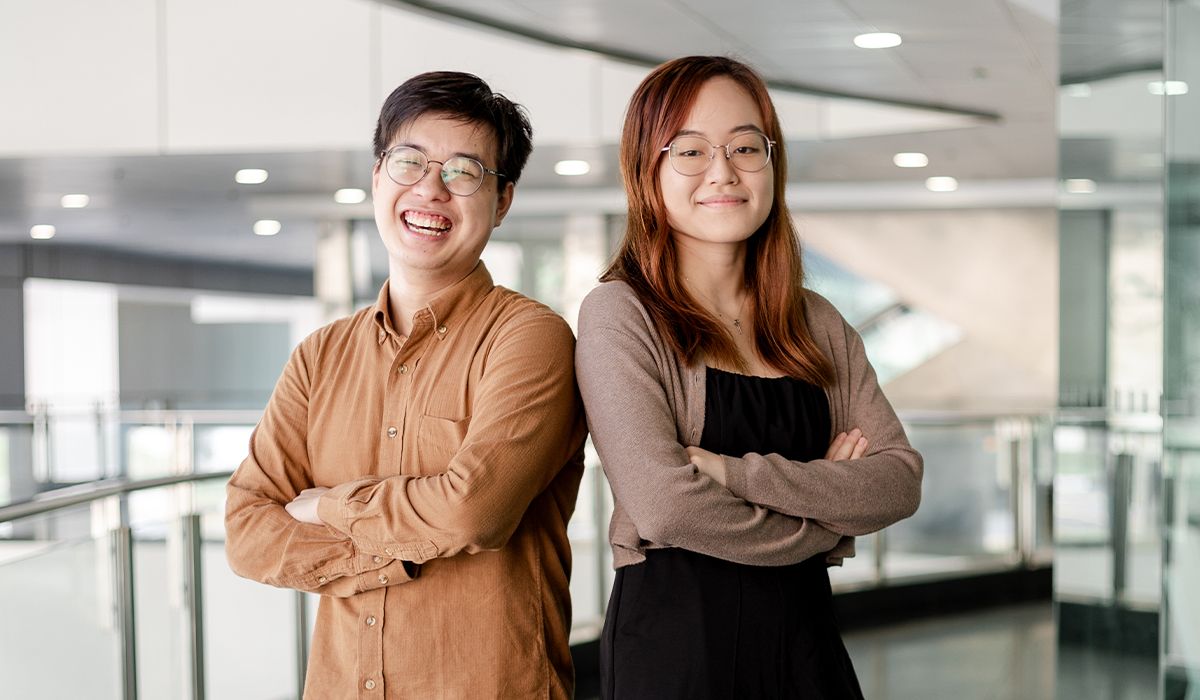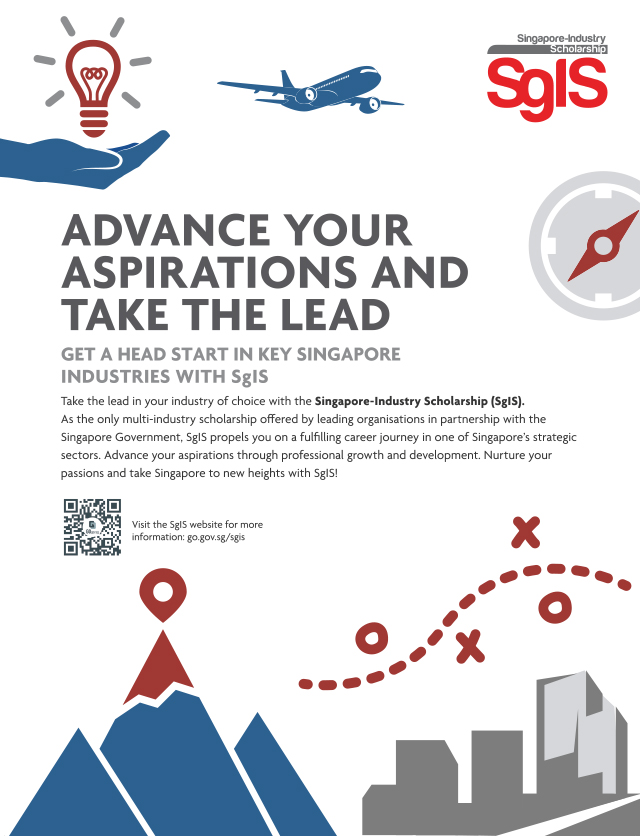Left: Lionel Lim is currently pursuing a Bachelor's degree in Business and Communication at NUS. He is a recipient of the SgIS Full-Term with the National Council of Social Service. He will be graduating in 2025.
Right: Stefanie Low was awarded the SgIS Mid-Term with Integrated Health Information Systems (IHiS). She is set to graduate from NTU with a Bachelor's degree in Business and Computer Science this year.
The Singapore-Industry Scholarship (SgIS) is the only multi-industry scholarship that opens doors to a world of possibilities for scholars from diverse backgrounds allowing them to be nurtured as future leaders across various industries in Singapore. Through the different SgIS programmes, scholars can not only gain invaluable industry exposure but also build a strong network of like-minded friends from different sectors.
Lionel Lim Jun Ting and Stefanie Low Jing Ting serve as prime examples of talented individuals who have thrived through this scholarship. Lionel is a SgIS Full-Term scholar under the National Council of Social Service (NCSS) and is currently pursuing a Bachelor’s in Business and Communication at the National University of Singapore (NUS). On the other hand, Stefanie is a recipient of the SgIS Mid-Term with Integrated Health Information Systems (IHiS) under MOH Holdings (MOHH) and is currently taking up a Bachelor’s in Business and Computer Science at Nanyang Technological University (NTU).
Despite their divergent career paths, both Lionel and Stefanie share a resolute determination to pursue their aspirations. We speak with both scholars as they share their enriching experiences and the valuable support that they have received through the SgIS.
Lionel, what made you pursue a degree in business and communication?
I was very fortunate to have discovered what I enjoyed doing before entering university – this tied very closely with human resource management, which was why I decided to apply for my undergraduate studies at the NUS Business School.
I also intend to specialise in Leadership & Human Capital at the NUS Business School. This specialisation will allow me to learn more about human resource development, as well as organisational behaviour theories in practical contexts. I chose this as I am interested to know about the “heartware” (beyond the hardware) of how organisations work, and I thought that it would be very useful for the social service sector too.
Stefanie, what sparked your interest in business and computer science?
My passion lies in the intersection of technology and business and how they work together to tackle complex problems and find innovative solutions.
I became more interested in how technology can be integrated into the business world to create breakthroughs. Apart from technical skills, I recognised the importance of soft skills, such as communication and teamwork in the workplace. That is why I was drawn to pursuing a degree in business, as it can provide me with these invaluable assets. Ultimately, my goal is to fuse my knowledge of business and computer science to create innovative solutions that will make a positive impact on society.
That’s really remarkable! So, what made you go for the Singapore-Industry Scholarship?
Lionel: I first found out about SgIS through a career fair in my junior college! I was really intrigued by the multi-industry nature of the scholarship and eventually decided that I wanted to pursue a career in the social service sector. I was glad to have chosen the SgIS as I was afforded the flexibility and autonomy to work and contribute to communities that I have a passion for.
Stefanie: I stumbled upon SgIS while scrolling through my school email. What caught my attention was the plethora of organisations available for selection. It is unique for a scholarship to allow you to choose between different organisations.
In addition, I discovered that MOH Holdings (MOHH) was one of the sponsors. This appealed to me as I have a profound interest in pursuing a career in the HealthTech industry. SgIS provides an incredible opportunity to not only acquire a quality education but also make a meaningful impact in my chosen field.
Has the scholarship enhanced your university experience?
Lionel: I did not have to worry about my finances as the scholarship covered my school fees, and expenses incurred from staying on campus. I was also very happy to have met like-minded friends through the SgIS Network, a community of fellow SgIS Scholars!
I am also empowered to explore new interests, even beyond schoolwork! NCSS is also very supportive of my trying other internship experiences too. I am currently interning in a technology-centric organisation, and I look forward to bringing what I have learnt to apply in the social service sector.
Stefanie: The scholarship not only provides financial support, but it also offers valuable academic and career assistance that has been tremendously beneficial to me during my university journey. One of the most valuable resources the scholarship provides is a network of peers and professionals in the healthcare sector. This has allowed me to establish connections and gain a deeper understanding of the industry from a first-hand perspective.
Lionel, in what ways has your involvement as a SgIS EXCO member enriched your experience and benefited you?
Lionel: As an EXCO, we drive programmes and efforts to better enrich the SgIS experience for all of our scholars. During my term, I learnt how to plan for large-scale events and grow a network organically with our various alumni and students to forge a strong support system.
Could you also share about your internship experience with NCSS at HEB-Ashram Halfway House and highlight some of the valuable lessons you have learnt?
Lionel: The experience afforded me opportunities to identify and solve problems that the social service sector faced with COVID-19 as a backdrop. For example, one of the workstreams was closely related to the National Council Against Drug Abuse, and we had to identify how the programmes we ran for our clients could value-add to the drug rehabilitation ecosystem. I learnt about the importance of coordinating with different stakeholders (government agencies, management staff, as well as clients) for us to deliver impactful programmes.
Stefanie, how has your internship with IHiS enriched your understanding of HealthTech?
Stefanie: During my internship, I witnessed how technology can revolutionise the healthcare sector. It streamlines processes, enhances patient care, and improves accessibility. From electronic health records to telemedicine, technology drives efficiency and innovation.
Data interoperability is a crucial aspect of HealthTech. Seamless exchange and integration of patient information across systems and providers are facilitated by standards like Fast Healthcare Interoperability Resources (FHIR), ensuring coordinated and comprehensive care. Cloud services are increasingly utilised in healthcare IT as well. They offer scalability, accessibility, and cost-effectiveness, enabling secure storage, analysis, and sharing of vast amounts of data. I gained hands-on experience developing a cloud-based Application Programming Interface (API) for the OneNUHS application, working in a large team and witnessing the software development lifecycle.
My internship revealed the dynamic nature of healthcare IT and its potential for transformation. I now appreciate how technology can advance healthcare, and I’m eager to contribute to its further development.
It sounds like you’ve both gained a wealth of knowledge and experience. How do you hope to apply this to your future endeavours?
Lionel: I hope to be able to provide fresh perspectives and lead change within the social service sector as we get ready for an increasingly digitalised world. I want to leverage what I learn in school and in my various internships, such as in change management and programme delivery, to better strengthen social service agencies’ efforts.
Stefanie: Having witnessed the transformative power of technology in healthcare, I aspire to delve deeper into the possibilities that technologies hold. I aim to explore how emerging technologies like artificial intelligence, machine learning and the Internet of Things can be harnessed to drive advancements and create impactful solutions in the healthcare industry. By keeping myself abreast of the latest technological trends and strategically applying them, I hope to contribute to the development of innovative healthcare solutions.
What advice would you give to students aspiring to apply for the SgIS?
Lionel: Go for it! Know where your passion and interests lie, and make sure to show that during the interviews! SgIS has strong partnerships with various industries so you can be sure you can find one for you.
Stefanie: I would recommend they conduct comprehensive research on the various sponsoring organisations available. I believe that it is crucial to delve deeper and discover which organisation aligns with your personal interests and career aspirations. By choosing an informed and discerning path, you can embark on a journey that supports your academic and professional growth.



